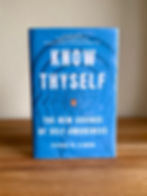I tried to get into a bit of a routine last year, of penning reviews for all the books I managed to read, cover to cover.
It was mainly as a way of summarising and ‘banking’ all the key lessons and take-homes that stood out as having made the time investment and discipline (ten minutes a day, every day) of each read worthwhile.
In keeping with this commitment, here’s a few thoughts on the book ‘Know Thyself’, by Stephen Fleming, which focuses on the science of ‘metacognition.’
That is, the ability to think about our own thinking.
As the topic suggests, this book doesn’t exactly constitute ‘light reading’, but what it lacks in this regard, it makes up for in sheer interest value and ‘tools’ for understanding ourselves better.
Primarily, the book posits that our capacity for reflective judgement is just as (if not more) important than our actual skills and abilities.
Apparently, it can make the difference between confidence and self-doubt, with far-reaching consequences for decisions, behaviour and their outcomes.
Propping up this idea, is evidence indicating how ‘metacognotive distortions’ can become self-fulfilling prophecies (eg. how thinking we can’t, means we probably won’t, even if we actually could have.)
This is one of the reasons why the author believes that education today should be skewed towards ‘learning how to learn’, rather than ‘cramming’ and over-stuffing children with facts.
Another vital take-home from this book, is how metacognitive fluency can create an illusion of skill, often compensating for a lack of know-how, and rigging activities in our favour.
It’s an idea encapsulated by findings
that men will typically apply for a promotion - as most likely get it - even when they don’t meet all the criteria (over-estimating their suitability), whereas women mostly don’t apply until they tick all or most of the skill/experience boxes required for the role (underestimating their capabilities.)
Underpinning these findings is the discovery that we ‘feel confident about decisions when we act quickly, even if faster responses are not associated with greater accuracy.’
The science of metacognition also goes some way to explaining that familiar ‘automode’ experience (when you’re able to do something, but aren’t able to explain how exactly you do it to other people). It’s called ‘expertise induced amnesia’, and it’s a symptom of how self awareness becomes redundant as skill increases.
On a summarising note, the author poses that one of the major issues with the modern-day trend of ‘finding yourself’, is that it overlooks the role of metacognition in unravelling ones idiosyncrasies.
As Stephen Fleming rightly points out, ‘it would be strange to encourage people to fix their cars, without knowing how the engine worked’ but somehow this same logic is not applied when dealing with the complex machinery of the mind.
Apparently, the neural machinery involved in metacognition is complex (as you’d expect), and so far, this extra scaffolding is the only thing that separates us from AI.
AI can do the thinking, but it’s not aware it is thinking.
One of the key questions the book asks, is whether machines will ever ‘usurp our role as captains of our destinies.’
It’s a scary prospect, but apparently not outside the realms of possibility.
This chapter of the book was by far the most mind-blogging of them all, especially for those with only a lay knowledge of computers and technology.
As for the rest of the book, certainly the most noteworthy point is that which suggests metacognitive abilities are not set in stone.
We can always get better at it (reducing stress is a good start, apparently) and in so doing, can become more adept at the art of ‘wanting what we choose, and choosing what we want.’
To quote the most salient paragraph:
‘Not only can adults learn new tricks, but we do not usually have any choice in the matter. The architecture of our brains is being subtly buffeted and updated by everything we do, whether we like it or not. Metacognition is not fixed or immutable.’
*This article contains an affiliate link.

